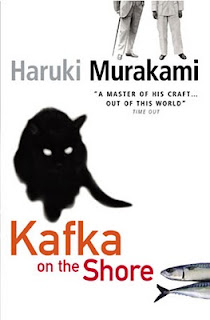 If I had even the slightest doubt about Salman Rushdie's writing prowess (not that I had), I knew it will disappear as soon as I found myself flipping the pages to see the da Gama-Zogoiby family hierarchy of The Moor's Last Sigh.
If I had even the slightest doubt about Salman Rushdie's writing prowess (not that I had), I knew it will disappear as soon as I found myself flipping the pages to see the da Gama-Zogoiby family hierarchy of The Moor's Last Sigh.By the time I reached the end of this book it struck me again, that Salman Rushdie is definitely a magician. Once in his hands, the words flow like a stream. Smooth, yet turbulent. Clear, yet enchanting. Simple, yet complex. Easy, yet profound.
Magic Realism at its best!
The Moor's Last Sigh is a multi-faceted epic, a family saga packed with high-intensity drama, rich descriptions, vivid recollections and razor-sharp satire. The Portugese-Indian Christian-Jewish family of traders, businessmen (and women), artists and (eventually) gangsters, moves from Cochin to Bombay to Spain, spanning over four generations. Throughout the generations, the only thing the family could strongly boast of were powerful, proud and imperfect women who raised the family's grace and profits by leaps and bounds. As daughters, as wives, as mothers, their manifestations of love varied from being absolutely protective to utterly destructive. In this family lineage is born an unfortunate, helpless, flawed man, Moraes 'Moor' Zogoiby.
Moor traces his family roots to when they arrived in Cochin as spice merchants, when the family disputes turned ugly, when rebellion and murders became the way of living, when his Jewish father and Catholic mother married amidst spices, when after three sisters he was born as the last heir to the da Gama-Zogoiby family, when he fell in love with Bombay and when he realized he wasn't like others. He explains his situation as- "If a birth is the fall-out from the explosion caused by the union of two unstable elements, then perhaps a half-life is all we can expect.", and a half-life is all that he gets. Being in his mother's womb for just four and a half months, aging twice as fast, wrinkled at the age of thirty, with a hammer-palm, he pens down the entire journey taking us through all the generations, their successes and failures, their love and hatred, their strengths and weaknesses, their strategies and lunacies, their morality and its decay.
All the characters have been sketched beautifully and the power associated with each of them is a marvel. Abraham, Mainduck, Uma and even the characters that popped up from Rushdie's previous works, Zenny and Adam, all leave their mark. A special mention, however, for Moor's mother and the artist, Aurora da Gama. She is perhaps the strongest 'Rushdie' character I've read till date. Her spirit, her sharp tongue, her charm, her struggle, her peppery romance with the then Prime Minister of India, her art, all added to make her as phenomenal as she was, making it absolutely believable that people around her would definitely consider her the centre of their universe and would readily dance to her tunes without questioning her motive even once.
Written during the time when Rushdie was in hiding on account of the 'Fatwah', The Moor's Last Sigh depicts the rise, fall and decline of a powerful family; as if subtly indicating the apprehensions Rushdie had towards his own predicament, saying towards the end (via Moor) "Here I stand; couldn't have done it differently."
Inspite of the situation he was in, the controversial tidbits have not been ignored at all. A stuffed dog named Jawaharlal, Raman Fielding (read Bal Thackeray) playing petty politics on Marathas and non Marathas, digging down the Gandhi-Nehru association, bringing forth the then prime minister's love life and the possibility of a by-blow, and ofcourse the list goes on!
Rushdie's word play, the rhyming jargon and the linguistic jokes add another appeal to the story. There are several parenthetical descriptions throughout which got me chuckling; one of them as he describes the origin of the name 'Sorryno' for a Bombay Iranian restaurant -
"(so called because of the huge blackboard at the entrance reading Sorry, No Liquor, No Answer Given Regarding Addresses in Locality, No Combing of Hair, No Beef, No Haggle, No Water Unless Food Taken, No News or Movie Magazine, No Sharing of Liquid Sustenances, No Taking Smoke, No Match, No Feletone Calls, No Incoming With Own Comestible, No Speaking of Horses, No Sigret, No Taking of Long Time on Premises, No Raising of Voice, No Change, and a crucial last pair, No Turning Down of Volume - It Is How We Like, and No Musical Request - All Melodies Selected Are to Taste of Prop)"
Just for the sake of complaining I would have liked it if the climax of the book was as delightful as the 400 odd pages before it. It seemed a bit too rushed in as if wrapping up a widely spread yarn just to get the covers on. Other than that, it's incredibly alluring. It wouldn't be the first time that I say, Rushdie's writing and narration is absolutely astonishing. The way he puts profound and philosophical thoughts so effortlessly is a sight to behold. As it happens with all of his books, one can never know if it's history giving way to his story or if it's his story paving way for history to occur.
Dazzling and heroic. Plain art.
"I sigh, therefore I am. A sigh isn't just a sigh. We inhale the world and breathe out meaning."

























